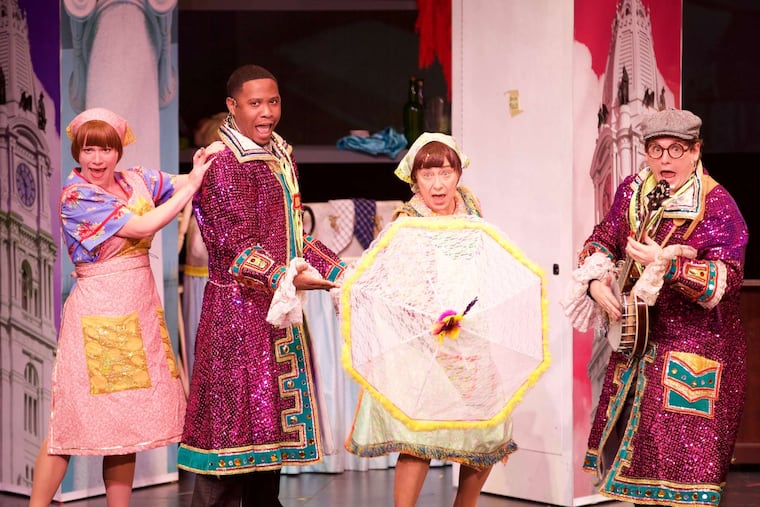Invoking two kinds of Philly sound in 'The Three Maries'
Michael Ogborn is a serious man, a musical theater composer, lyricist, and librettist of intricate song and complex characterization who has touched on the dread and sensationalism of the Lindbergh kidnapping (Baby Case), darkly comic obsession (Tulipomania), the insanity of high school sports (Field Hockey Hot), and ardent AIDS activism (C'est la Guerre!) with Sondheimian guile.

Michael Ogborn is a serious man, a musical theater composer, lyricist, and librettist of intricate song and complex characterization who has touched on the dread and sensationalism of the Lindbergh kidnapping (Baby Case), darkly comic obsession (Tulipomania), the insanity of high school sports (Field Hockey Hot), and ardent AIDS activism (C'est la Guerre!) with Sondheimian guile.
"I like to write about whatever inspires me. An inspiration that can last until the play is completed," Ogborn says from his home in Manhattan. He may live there now, and his work may be seen all over the country, but his hometown is Philadelphia, and that's what inspired his latest musical, The Three Maries - A Philadelphia Phable, which begins previews Thursday at the Prince Theater.
The Mummers, the accent, and the real-life event that sparks its story, a 1926 visit by Queen Marie of Romania - "nearly as big" in its time as Pope Francis' visit was in ours - converge to make The Three Maries not only deliciously funny but intensely local as well. It's his first play set in Philadelphia since 1981's Fishwives. What took him so long?
"Fishwives was my very first play, a 'write about what you know' show. I always knew I would turn my attentions home again with the right story. When I found this one, it was time."
The setting is a South Philadelphia Mummers' clubhouse, where neighbors await the arrival of Queen Marie, coming to attend the city's Sesquicentennial International Exposition. There, amid the highly ethno-accented Two Street throng, a musical tale wit' ties to Pygmalion and Cinderella unspools.
As a kid growing up in Roxborough, Ogborn, now in his early 50s, loved the carefree, giddy songs ("my refuge") of movie musicals from Warner Bros. and MGM. Though he didn't study music until he was 14, "as soon as I learned my way around the circle of fifths," he was writing songs.
Fans will recall that his earliest musicals - including his Off-Broadway debut, 1993's Box Office of the Damned with a young Kristen Chenoweth - felt as though they were gleaned from the great prewar American musical comedies. His latest harks back to that.
"I wrote The Three Maries as a classic American musical comedy from the 1920s," he says, with the Tin Pan Alley music of the period that works well with the Mummers sound and the spirit of the time. "It's a story of a young woman finding her way, making life choices her mother never had to make, with a score featuring comedy duos and trios."
One particular Pygmalion moment opens the second act with a diction lesson at the Bellevue Hotel - "Jingle Dem Jewels," - set to the unmistakable music of South Philadelphia's string-band sound. "The clubhouse is a sacred place to the Mummers, where all the magic happens," he says. "Using this as a starting point, the physical production then takes on the spirit of the house, a new place we haven't seen on stage before."
Plus, there's that accent, of a place where "water" sounds like "warhder," where "coffee" pours like "cawfee," "streets" are "shtreets," and where no "with" or "without" will ever meet with its "th."
Ogborn first realized he had an accent when he arrived at DeSales University in Lehigh County to study theater and speech. Part of the curriculum was to "de-dialect" every student planning a career in theater. "My accent was strong enough," he says, "that when I went home for my first vacation, my family teased me for speaking like I was from England."
The Three Maries concerns language and regional dialects, so Ogborn's speech training has come in handy. "There is so much fun to be had with the Philly accent - it's so difficult to reproduce and that makes it enigmatically singular," he says.
It's so much a part of The Three Maries that auditions required a command of its tones, bends, and dips. "Not everyone has an accent," he says. "It's a class distinction in the show. We wanted actors with musical ability and generous spirits to tell this story from the heart." The show is a love letter both to Philadelphia and from Philadelphia.
"He has a great big heart," says Rachel Brennan, a native of Jeffersonville, Montgomery County, and the littlest of the Maries; the others are Kathy Deitch's Big Marie and Mary Martello's Queen Marie. To Brennan, Ogborn is a genius. "It still boggles my mind how he can write such brilliant music in so little time," she says, having worked with him on 2011's Treasure Island, 2013's The Three Musketeers (both People's Light) and 2014's Field Hockey Hot for the 11th Hour Theatre Company at the Adrienne.
The Three Maries feels more frivolous than her usual Ogborn parts, and this time, Brennan is using her original strong Philly accent - one that, like Ogborn and Little Marie herself, she didn't realize she had. "That is, until I went to college in D.C. Then, I - with the help of my parents - paid a lot of money to learn how to get rid of it.
"Now, I'm able to go back and forth rather easily, but it's definitely an infectious dialect you can't help slip into when you are around other Philly folk. You'll hear it."
The Three Maries - A Philadelphia Phable
Thursday through Jan. 10 at the Prince Theater, 1412 Chestnut St.
Tickets: $27-$52.
Information: 215-422-4580, princetheater.org.